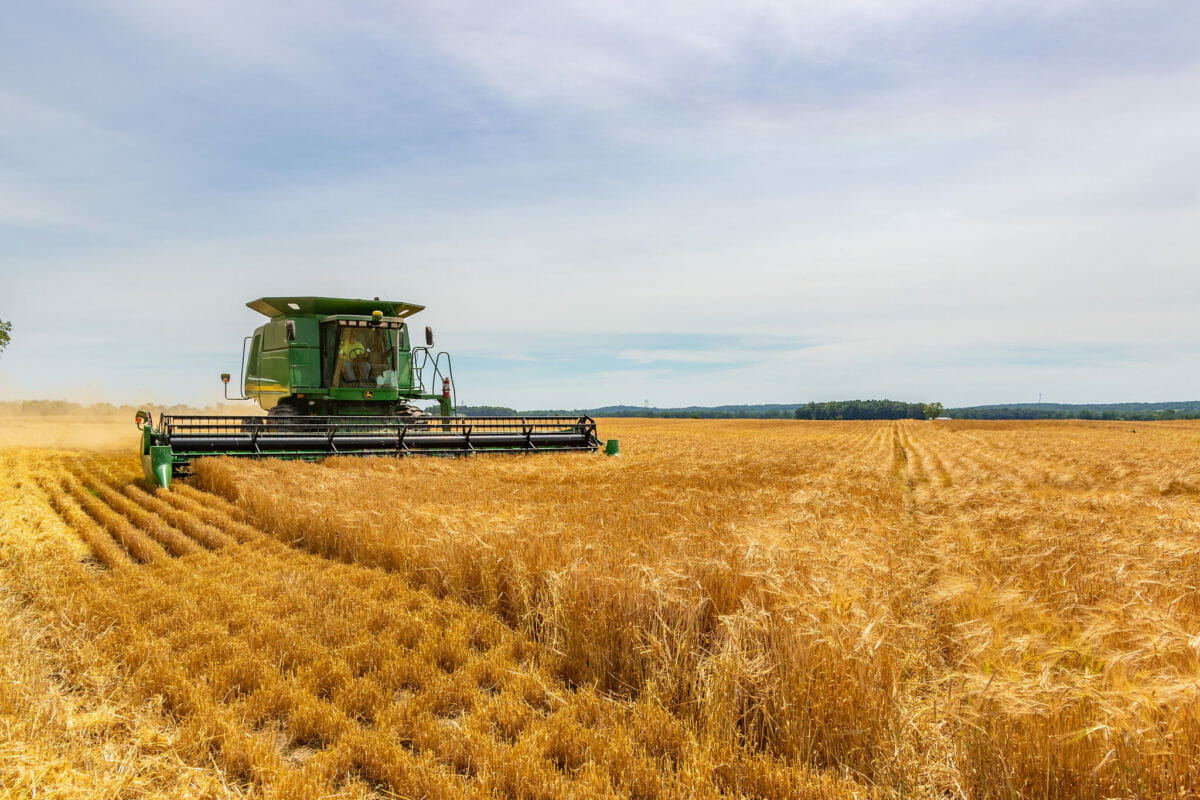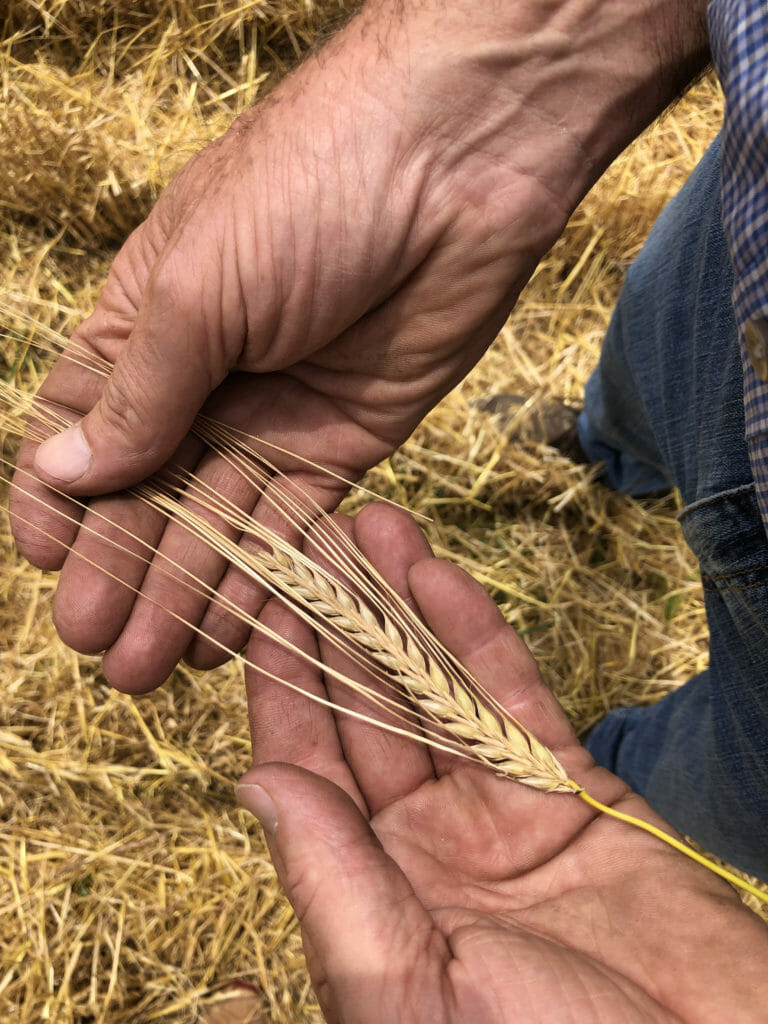A Century After Prohibition, Barley Makes Inroads in the Midwest
In Ohio, there are nearly 300 breweries in operation, increasingly thirsty for locally produced ingredients.
A Century After Prohibition, Barley Makes Inroads in the Midwest
In Ohio, there are nearly 300 breweries in operation, increasingly thirsty for locally produced ingredients.

courtesy of Origin Malt.
Craft breweries who want to use locally grown and malted barley in the Midwest are in a bit of a predicament.
“Currently, we produce more beer than they can produce malt,” says Kelsey Stief, the director of sales at Columbus, Ohio’s North High Brewing. Half of the beers produced by Stief’s company contain barley grown or malted by the few maltsters at work in the region. The reason this figure is not higher, she claims, is because there’s not enough Ohio or Midwest malt available on the market.
In Ohio, there are nearly 300 breweries in operation. Nationally, this figure hovers over 7,000, the highest in the history of the US. Many of these makers, like North High Brewing, are increasingly thirsty for locally produced inputs for their products.
Barley, a key ingredient in beer and some distilled liquors, was plentiful in the Midwest prior to the passage of Prohibition in 1920. Nearly 350,000 acres of malting barley were in production in Ohio alone and four of the largest malting facilities in the United States were located within the state’s borders.
Prohibition decimated beer and spirit makers in the region and, more generally, the US. As these companies and the maltsters that served them shuttered their doors, growers increasingly turned to other crops for income like the corn, soybeans and wheat that now grow plentifully.
By the start of the twenty-first century, barley cultivation numbered only several thousand acres per year in Ohio alone, most of which was devoted to animal feed. Today, European production dominates the global malted barley market and many American breweries, large and small, rely on product imported from abroad.
“It dawned on me one day: Why aren’t we growing winter barley in Ohio for malting and brewing?” says Eric Stockinger, a molecular biologist at the Ohio State University with research interests in plant freeze intolerance. The academic is also a dedicated homebrewer. Since 2008, Stockinger has studied barley production in the region, trialing hundreds of varieties of the crop. This work has garnered significant interest from growers and beverage makers.

“We have the ideal environment for growing winter barely for malting purposes,” Stockinger says on a cold January day from a research station in northeast Ohio. He calls the Midwest’s soil moisture levels “nonlimiting” during the crop’s seedling establishment and grain fill. Due to this, Stockinger claims, high-quality grain for malting can be obtained.
Though Stockinger has worked with spring varieties of the crop, he says that, in the Midwest, the winter species consistently produces greater yields. “Winter barley matures about one month earlier than spring barley. Grain fill occurs earlier and during cooler temperatures, which is better for carbohydrate-to-protein ratios,” Stockinger notes regarding the elements valued in the brewing process.
Additionally, winter barley fits seamlessly into overall crop rotation in the region, he points out. “Winter barley can follow soybeans,” Stockinger says, noting that in places like Ohio, spring barley competes with summer crops such as soybeans and corn. Furthermore, the crop serves as a winter cover on fields that may have lain barren in years prior, providing valuable ecosystem services such as erosion and runoff prevention, wildlife habitat and soil nutrients.
Victor Thorne, co-founder of Ohio-based Origin Malt, a start-up that supplies malt to brewers and distillers, says that he and partner Ryan Lang launched their company due to demonstrated industry demand for local supply of the product.
For the 2019-2020 growing season, the company has contracted more than 80 growers in four states to cultivate nearly 10,000 acres of malting barley for them. Origin Malt processes the harvest into malt at a partner facility and sells the product to breweries and distilleries. Over the next five years, Thorne says, his company plans to scale to at least 75,000 acres of malting barley production under contract with growers. They also plan to launch their own malting operation in central Ohio, he claims. “The ultimate goal is to have a tightly wound supply chain, so nothing has to move more than 300 miles from seed to sip,” Thorne says.
One variety Stockinger has trialed, called Puffin, originates from the United Kingdom and has appeared extremely promising in Midwest fields. Not only are Puffin’s flavor profile, consistent quality and yield potential appealing, but the crop’s ability to withstand extreme weather fluctuations has proved outstanding. “When the polar vortex hit Ohio, Puffin was the only variety that fully survived the freeze,” says Whitney Thompson, Origin Malt’s procurement manager. The company has purchased the rights to Puffin cultivation in the United States.
Meanwhile, back at North High Brewing, Stief claims that her company doesn’t source inputs locally to simply tick a box on a consumer trend wish list. Instead, she says, it’s due to economics. “We’re not paying to put it on a rail car, then a semi and finally a truck to be driven to us,” Stief says. She adds that, for her company, it’s cheaper to purchase malt from the region than to incur freight costs by ordering from a supplier across the continent or ocean.
Growers, too, have caught wind of the potential of malting barley production in the Midwest. “I’ve been growing barley for 15 to 20 years,” says Tod Crumrine, owner of Crumrine Family Organic Farms near Nova, Ohio. This year, Crumrine has 15 acres under cover. “My crop looks good,” the farmer says optimistically. Although he has yet to try the malting variety—Crumrine cultivates organic feed for sale to dairies—he notes that he’s keen to learn more as he watches neighbors successfully cultivate for an ever-expanding list of nearby distilleries and breweries.
Follow us

This work is licensed under a Creative Commons Attribution-NoDerivatives 4.0 International License.
Want to republish a Modern Farmer story?
We are happy for Modern Farmer stories to be shared, and encourage you to republish our articles for your audience. When doing so, we ask that you follow these guidelines:
Please credit us and our writers
For the author byline, please use “Author Name, Modern Farmer.” At the top of our stories, if on the web, please include this text and link: “This story was originally published by Modern Farmer.”
Please make sure to include a link back to either our home page or the article URL.
At the bottom of the story, please include the following text:
“Modern Farmer is a nonprofit initiative dedicated to raising awareness and catalyzing action at the intersection of food, agriculture, and society. Read more at <link>Modern Farmer</link>.”
Use our widget
We’d like to be able to track our stories, so we ask that if you republish our content, you do so using our widget (located on the left hand side of the article). The HTML code has a built-in tracker that tells us the data and domain where the story was published, as well as view counts.
Check the image requirements
It’s your responsibility to confirm you're licensed to republish images in our articles. Some images, such as those from commercial providers, don't allow their images to be republished without permission or payment. Copyright terms are generally listed in the image caption and attribution. You are welcome to omit our images or substitute with your own. Charts and interactive graphics follow the same rules.
Don’t change too much. Or, ask us first.
Articles must be republished in their entirety. It’s okay to change references to time (“today” to “yesterday”) or location (“Iowa City, IA” to “here”). But please keep everything else the same.
If you feel strongly that a more material edit needs to be made, get in touch with us at [email protected]. We’re happy to discuss it with the original author, but we must have prior approval for changes before publication.
Special cases
Extracts. You may run the first few lines or paragraphs of the article and then say: “Read the full article at Modern Farmer” with a link back to the original article.
Quotes. You may quote authors provided you include a link back to the article URL.
Translations. These require writer approval. To inquire about translation of a Modern Farmer article, contact us at [email protected]
Signed consent / copyright release forms. These are not required, provided you are following these guidelines.
Print. Articles can be republished in print under these same rules, with the exception that you do not need to include the links.
Tag us
When sharing the story on social media, please tag us using the following: - Twitter (@ModFarm) - Facebook (@ModernFarmerMedia) - Instagram (@modfarm)
Use our content respectfully
Modern Farmer is a nonprofit and as such we share our content for free and in good faith in order to reach new audiences. Respectfully,
No selling ads against our stories. It’s okay to put our stories on pages with ads.
Don’t republish our material wholesale, or automatically; you need to select stories to be republished individually.
You have no rights to sell, license, syndicate, or otherwise represent yourself as the authorized owner of our material to any third parties. This means that you cannot actively publish or submit our work for syndication to third party platforms or apps like Apple News or Google News. We understand that publishers cannot fully control when certain third parties automatically summarize or crawl content from publishers’ own sites.
Keep in touch
We want to hear from you if you love Modern Farmer content, have a collaboration idea, or anything else to share. As a nonprofit outlet, we work in service of our community and are always open to comments, feedback, and ideas. Contact us at [email protected].by Nicole Rasul, Modern Farmer
February 2, 2020
Modern Farmer Weekly
Solutions Hub
Innovations, ideas and inspiration. Actionable solutions for a resilient food system.
ExploreExplore other topics
Share With Us
We want to hear from Modern Farmer readers who have thoughtful commentary, actionable solutions, or helpful ideas to share.
SubmitNecessary cookies are absolutely essential for the website to function properly. This category only includes cookies that ensures basic functionalities and security features of the website. These cookies do not store any personal information.
Any cookies that may not be particularly necessary for the website to function and are used specifically to collect user personal data via analytics, ads, other embedded contents are termed as non-necessary cookies.